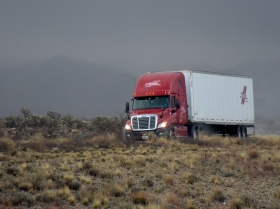

There are many buzzwords that define the era of digital and transformation. From IX (industrial digital transformation) to Industry 4.0; these terms describe the emergent technologies and platforms that allow for organisations across sectors such as transport, logistics and manufacturing, to refine operational excellence and business process optimisation in increasingly tight economic times.
Industry 4.0 and IX are driven by the Internet of Things (IoT), machine learning (ML), artificial intelligence (AI), long-range wireless networks and connectivity. According to Pieter Pienaar, CEO of Informed Decisions and chairperson at the IOT Industry Council of South Africa (IOTIC), these solutions can be integrated into the organisation to measurably improve efficiencies.
“The technologies of AI, ML, IoT and wireless networks allow for the transportation sector to refine telemetry optimisation and potential and herald a new era in how the sector can approach telemetry, vehicle and driver optimisation and security and leverage these to harness the potential Industry 4.0,” he explains.
Telemetry has been around for a long time and it has evolved to provide increasingly relevant features and services to the sector. The technology that underpins it is sound and manufacturers have long-standing experience. For many, this makes it a tried and trusted platform that doesn’t need to change. However, like any solution, telemetry is facing a digital revolution, one that allows for significant benefits in cost reduction, functionality and capability.
Improved services and value-add
“Sure, companies ask why they are fixing what isn’t broken, but the value of a hyper-intelligent and scalable telemetry platform that can integrate with data, systems and networks, cannot be understated,” adds Pienaar. “The first benefit and this is one that the sector would appreciate right now, is cost. The cost of production of these highly intelligent telemetry platforms has drastically decreased and they are 50% cheaper for equal quality. Plus, they include functionality that was previously unobtainable.”
Companies can now benefit from low-powered devices that can integrate across multiple devices and platforms, from tablets to wearables and that can be optimised to track the metrics that meet changing market requirements. Now, with the technology at the transport sector’s disposal, companies can focus on monitoring, driver management, asset management, load optimisation and efficiencies across warehouses and JIT – critical key performance indicators (KPIs) that have come to define success in the current market.
“There is a marked change around what companies consider to be their KPIs today, these have evolved due to social and economic pressures,” says Pienaar. “Now the focus is on security, monitoring, tracking and recovery and on tools that allow for these processes to be managed more efficiently and easily. Fleet managers and companies want real-time, they want insights and they want simplicity.”
Real solutions to real problems
The value of this technology can be found in a deep dive into the common problems that impact the sector. For example, one of the primary causes of accidents is driver fatigue and this occurs within the first hour of driving. Technology can mitigate this by monitoring driver sleep patterns to predict fatigue, by asking the driver to complete cognitive tests before driving to measure their ability to concentrate and by using a fatigue camera to monitor driver behaviour.
“IX uses all the technology at its disposal to create an holistic approach to drivers and driving behaviour,” says Pienaar. “This is key to effectively caring for and managing human resources. The right technology allows for the organisation to combine devices to work together to achieve very clear goals at a reduced total cost of ownership (TCO).”
Another area that benefits from the advances of digital is vehicle monitoring and tracking. While technology hasn’t changed much, it has become cheaper with significantly better features that meet very real operational needs. Many of the latest solutions have been designed to deliver the same functionality that companies have come to expect from monitoring and tracking solutions, but with additional functionalities that resolve the limitations of the past.
“Companies can now benefit from multiple device integrations and functionalities at scale and the ability to manage safety and well-being from remote locations,” says Pienaar. “And when it comes to loading monitoring and security, new technologies allow for physical security, separate trailing tracking and direct cargo tracking to help companies physically secure their cargo as efficiently as possible.”
The future of transportation lies in the holistic application of intelligent technology that’s increasingly cost-effective to implement and that delivers a measurable return on investment. From IoT to IX and every touchpoint in between, this technology is designed to mitigate the risks and overcome the challenges facing the sector. It has the potential to allow for the industry to do more with less while reducing loss to theft, improving driver wellness and optimising process and capability.

© Technews Publishing (Pty) Ltd. | All Rights Reserved.